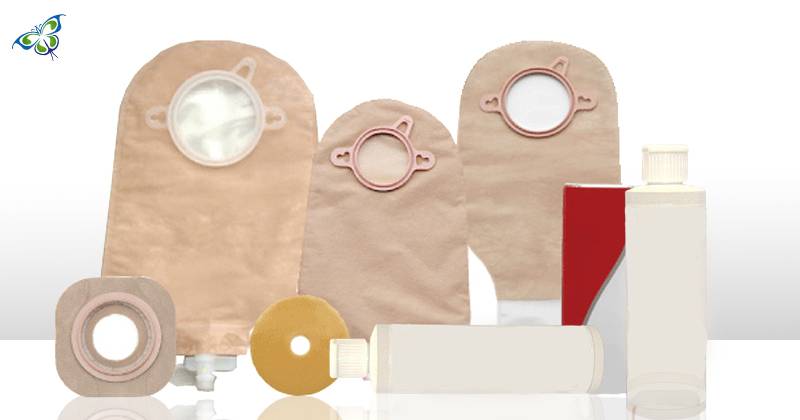
Hello
Select Address

An introduction to what ostomy is?
Ostomy (more commonly known as Stoma) is a surgical opening that is created on different regions of a human body to help excrete urine, stool or debris and other waste products during medical situations that don’t allow normal excretory processes. are appliances used to prevent odor-causing situations like leakage, gas formation, etc. There are mainly three types of ostomy i.e. ileostomy (where the stoma is created with a hole connecting it to the extended part of the ileum i.e. the small intestine), urostomy (where the stoma is created for the urinary system), and colostomy (where the stoma is created with a hole connecting it to the extended part of the colon i.e. the large intestine).
Common Problems Faced with Ostomy
While dealing with ostomy pouches, one might face a multitude of problems, especially during the beginning days. An overwhelming odor during the drainage of materials from the pouch, leakage due to improper placement, reddening or infection of the peristomal skin due to improper care, especially in-pouch problems like pancaking (stool sticking to the upper part of the pouch) and excessive gas formation (due to intake of sugar and fiber-rich foods).
Ostomy bag deodorants are available for various purposes. Some liquid deodorants are used to retain the odor of the excretions inside the pouch (should be applied before using and after drainage), some gets devoid of the odor completely, some can be used as a lubricator and deodorant that is to be used inside the pouch, some can be induced within the contents of the pouch to neutralize the odor, and some can be applied around the stoma and inside the filter itself. The odor eliminators are available as liquid ostomy deodorant, ostomy deodorant spray, ostomy deodorant drops, ostomy lubricating deodorant, ostomy deodorant tablets or capsules and filter forms.
Foods, especially to deal with the ostomy odor
Though all fecal contents have a distinctive smell, the odor can get stronger with the presence of external compounds like pus, blood, other waste products and especially, food content. Here is a list of foods that can increase the odor strength of the excretions, and a counter-list of foods that will help to lower the same.
• Odor increasing foods – Asparagus, Broccoli, Baked Beans, Vitamins (some), Peanut Butter, Brussel Sprouts, Cheese, Majority of Lactose (milk-based) Products, Cod Liver Oil, Cabbage, Eggs, Onion, Garlic, Fish. These are the products that affect the ostomy contents with their olfactory components. Many other foods, such as Apricots, Apples, Beer, Mangoes, Nuts, Pears, Peaches, Raisins and Sodas of any variety can lead to ballooning (Enlargement due to the presence of excessive gas) of the ostomy pouch because of the presence of sucrose and fiber contents in them.
• Other factors that might lead to a strong odor – Regular usage of chewing gums, drinking beverages through straws, smoking, any variety of carbonated beverages, eating or drinking too quickly (especially without chewing properly) can lead to excessive intake of air into your liver, which, in turn, will lead to the form of gas.
• Odor neutralizing foods – Food products like Kaffir Leaves, Cinnamon, Cardamom, Cranberry Juice, Tomato Juice, Orange Juice, Parsley, Oregano, Yoghurt and other herbs and fruits with a neutral or pleasant flavor will help to neutralize the odor content of the excretions. Consuming Mints or odor-reducing tablets will help to do the same, too.
The presence of regular foul odor indicates the improper placement of the ostomy pouch, or loosening of the peristomal skin, or a defect in the pouch itself. Be sure to use the perfect adhesive with a deodorized filter to ensure proper placement of the pouch. Change or drain the pouch after it’s filled halfway through and use a lubricating deodorant to avoid pancaking of the stool around the mouth of the pouch itself. Charcoal filters are said to eliminate the odor at a significant amount – but do not improvise pouring anything similar into the filter, or it might lead to complications in the stoma.
There are many practices of improvised odor reduction processes and materials written in various ostomy forums or threads, and most of them mainly consist of using Tic-tac and Trebor mints, Peppermint Tea and Tablets, Polos, Essential Oils, Bleach or Peroxide, Charcoal, Room Fresheners, Normal Deodorants or Perfumes, and Detergents. However, it is advised to not use them without prior consultation with your physician as they can be of little to no effect and can be severely harmful to your stoma if used directly on the skin.
Pouching system deodorants are easier to use as they can be induced directly into the pouch through an opening and is a travel-friendly option letting you travel anywhere and eat anything without being worried or embarrassed at each step. The benefits of using medical ostomy deodorant are that they consist of colorless, odorless, latex-free, anti-bacterial, non-toxic, instant-odor eliminating compounds – and are available in both large containers and single-use pouches and tubes. Here is an assortment of odor neutralizers to start your hunt off with – this is a list of some of the best ostomy deodorants that are available in the market.
[Read more on: ostomy care]
Ostomy leakage is a challenge faced by almost all ostomates at some point of time or the other. There are a few tips that need to followed carefully to avert the leakage. The ostfomy pouch not ponly needs to be changed regularly but also the emptied before it gets more than half-filled! An overweight pouch causes strain to the skin barrier and might cause leakage issues. Be careful during any physical intimacy, exercise, sports, or any other activity. A support garment to hold the pouch in place is highly advisable. Lastly, be careful while removing your skin barrier to save yourself from skin stripping - that causes pain, irritation, and leakage issues too.